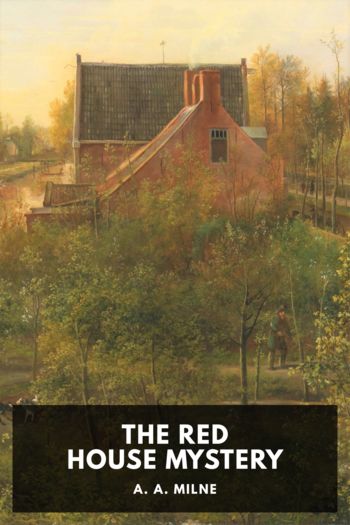Short Fiction - Edgar Allan Poe (book reader for pc .TXT) 📗

- Author: Edgar Allan Poe
Book online «Short Fiction - Edgar Allan Poe (book reader for pc .TXT) 📗». Author Edgar Allan Poe
“Analogous experiments in respect to sound produce analogous results.” ↩
Place a platina crucible over a spirit lamp, and keep it a red heat; pour in some sulphuric acid, which, though the most volatile of bodies at a common temperature, will be found to become completely fixed in a hot crucible, and not a drop evaporates—being surrounded by an atmosphere of its own, it does not, in fact, touch the sides. A few drops of water are now introduced, when the acid, immediately coming in contact with the heated sides of the crucible, flies off in sulphurous acid vapor, and so rapid is its progress, that the caloric of the water passes off with it, which falls a lump of ice to the bottom; by taking advantage of the moment before it is allowed to remelt, it may be turned out a lump of ice from a red-hot vessel. ↩
The Daguerreotype. ↩
Although light travels 167,000 miles in a second, the distance of 61 Cygni (the only star whose distance is ascertained) is so inconceivably great, that its rays would require more than ten years to reach the earth. For stars beyond this, 20—or even 1000 years—would be a moderate estimate. Thus, if they had been annihilated 20, or 1000 years ago, we might still see them today by the light which started from their surfaces 20 or 1000 years in the past time. That many which we see daily are really extinct, is not impossible—not even improbable.
The elder Herschel maintains that the light of the faintest nebulae seen through his great telescope must have taken 3,000,000 years in reaching the earth. Some, made visible by Lord Ross’ instrument, must, then, have required at least 20,000,000. ↩
An incident, similar in outline to the one here imagined, occurred, not very long ago, in England. The name of the fortunate heir was Thelluson. I first saw an account of this matter in the “Tour” of Prince Puckler Muskau, who makes the sum inherited ninety millions of pounds, and justly observes that “in the contemplation of so vast a sum, and of the services to which it might be applied, there is something even of the sublime.” To suit the views of this article I have followed the Prince’s statement, although a grossly exaggerated one. The germ, and in fact, the commencement of the present paper was published many years ago—previous to the issue of the first number of Sue’s admirable Juif Errant, which may possibly have been suggested to him by Muskau’s account. ↩
ColophonShort Fiction
was published between 1832 and 1849 by
Edgar Allan Poe.
This ebook was produced for
Standard Ebooks
by
Robin Whittleton,
and is based on a transcription produced in 2008 by
David Widger
for
Project Gutenberg
and on digital scans available at the
Internet Archive (vols. 1, 2, 3 and 4).
The cover page is adapted from
Saint-Séverin,
a painting completed in 1909 by
Robert Delaunay.
The cover and title pages feature the
League Spartan and Sorts Mill Goudy
typefaces created in 2014 and 2009 by
The League of Moveable Type.
The first edition of this ebook was released on
November 18, 2020, 12:18 a.m.
You can check for updates to this ebook, view its revision history, or download it for different ereading systems at
standardebooks.org/ebooks/edgar-allan-poe/short-fiction.
The volunteer-driven Standard Ebooks project relies on readers like you to submit typos, corrections, and other improvements. Anyone can contribute at standardebooks.org.
UncopyrightMay you do good and not evil.
May you find forgiveness for yourself and forgive others.
May you share freely, never taking more than you give.
Copyright pages exist to tell you can’t do something. Unlike them, this Uncopyright page exists to tell you, among other things, that the writing and artwork in this ebook are believed to be in the U.S. public domain. The U.S. public domain represents our collective cultural heritage, and items in it are free for anyone in the U.S. to do almost anything at all with, without having to get permission. Public domain items are free of copyright restrictions.
Copyright laws are different around the world. If you’re not located in the U.S., check with your local laws before using this ebook.
Non-authorship activities performed on public domain items—so-called “sweat of the brow” work—don’t create a new copyright. That means nobody can claim a new copyright on a public domain item for, among other things, work like digitization, markup, or typography. Regardless, to dispel any possible doubt on the copyright status of this ebook, Standard Ebooks L3C, its contributors, and the contributors to this ebook release this ebook under the terms in the CC0 1.0 Universal Public Domain Dedication, thus dedicating to the worldwide public domain all of the work they’ve done on this ebook, including but not limited to metadata, the titlepage, imprint, colophon, this Uncopyright, and any changes or enhancements to, or markup on, the original text and artwork. This dedication doesn’t change the copyright status of the underlying works, which, though believed to already be in the U.S. public domain, may not yet be in the public domain of other countries. We make this dedication in the interest of enriching our global cultural heritage, to promote free and libre culture around the world, and to give back to the unrestricted culture that has given all of us so much.





Comments (0)